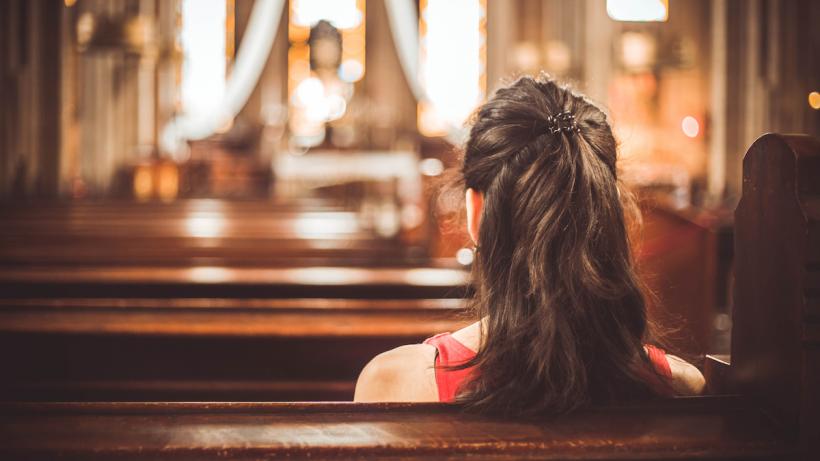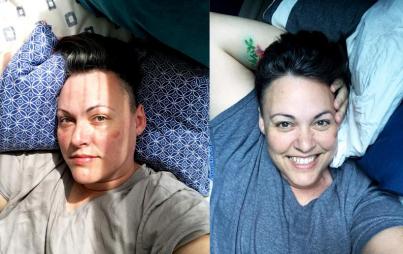
It was hard to gender God female because it felt like lying.
As a kid, my family’s male-focused religion often left me feeling like I was a member of the second-best sex. I internalized a lot of Sunday morning sexism as I was taught about “biblical gender roles” and “submission” and “a woman’s place.”
And I was taught something else that might not seem harmful: god was male.
Within a monotheistic context where it was considered sinful to say god was anything but a man, male pronouns and imagery reigned supreme. The classic Christian metaphors said the divine could be compared to a father, son, or brother — but not a mother, daughter, or sister. God could be shown with a penis but never a vagina. The divine was indisputably a dude.
I remember browsing an import store as a kid, noticing the decorations that seemed foreign to my American-evangelical childhood. There were chubby bronze Buddhas and colorful Tibetan prayer flags, but it was the statues and paintings of goddesses that worried me. I couldn’t think of anything more disrespectful or offensive than saying that maybe she — the great divine — was like me.
Children’s Sunday School teachers taught that people were “made in the image of god.” But this divine-blueprint business seemed to only apply to the boys. It didn’t apply to boobs or periods. God embodied everything that was right and good — and this pinnacle of perfection was male.
My religious tradition had given me an incomplete and limited picture of god. But what upset me the most was the image I’d internalized of myself as a woman — that I was broken and somehow less-than.
It wasn’t until college, when I started taking gender studies classes, that I really began to question the idea of the divine having a gender. If god was outside of time itself, how could she be restrained by modern American gender norms? If she was the god to everyone, why would only cis men be able to relate? And if sticking humans in little gendered boxes can be restrictive and completely inaccurate, how can we gender the goddess of the universe with any chance of accuracy?
During this time, I randomly stumbled across the memoir Dating Jesus: A Story of Fundamentalism, Feminism, and the American Girl by Susan Campbell. I bought it immediately when it popped up in my Amazon recommendations. The title alone had me hooked. And while I enjoyed the book, it was worth the cover price for one little word: mother. Campbell briefly called god mother.
Seeing god gendered female on a page was jarring. I set the book in my lap so I could process the idea. I suspect the boys and men within the religious paradigm I was raised never noticed how the divine pronouns matched their own, and likely didn’t find it revolutionary or healing. But I got tears all over that page in my paperback book.
Crying in my bed while holding the memoir was when I realized how strongly I’d always believed god was male, and how deeply that view of her impacted my identity and sense of worth. My religious tradition had given me an incomplete and limited picture of god. But what upset me the most was the image I’d internalized of myself as a woman — that I was broken and somehow less-than.
If one little word could be so powerful, I wondered what would happen if I heard god gendered female more regularly. Maybe, if it became more common, I’d start believing in my own self-worth. So I decided to embark on the spiritual practice of calling god a girl.
I wanted to embrace the divine feminine to learn how to embrace myself, and it seemed like publicly declaring that she was like me was a pretty damn good way to start.
It turned out to be a lot harder than I’d imagined. The goal was to exclusively use female pronouns for god, but at first, I stopped using pronouns altogether. When I’d say something about her, I’d go to extreme lengths to avoid pronouns. I’d mentally contort sentences before letting them slip out of my mouth so I could feel like I was keeping my commitment, while not actually using any god-pronouns at all.
I knew some people would view using “she” or “her” as heretical and they might be angry, but it wasn’t a fear of potential reactions that made it hard to spit out the words. It was hard to gender god female because it felt like lying.
“It’s hard to say things when they don’t feel true,” my therapist told me.
My therapy assignment had been to stop calling myself broken and instead to start using the word whole, but I’d been having a hard time because it didn’t feel accurate.
“Continuing to say it develops new brain pathways,” she reminded me. “The more you say it, the more it’ll feel true.”
And the same applied to swapping god-pronouns. As I continued to force myself to say it despite the awkwardness, the “made in the image of god” idea started to feel true.
When I told a friend, who’d been raised within the same religious subculture, about my decision to only use female pronouns for god, she immediately understood why it’d be healing. She felt the same validation of her self-worth. And she felt the same uneasiness about saying the words, herself.
My friend told me that gendering god female changed the way she saw the divine, and that made it uncomfortable. It felt scandalously sacrilegious, maybe even wildly heretical. A little shift in pronouns slowly altered her picture of the divine and herself — which was beautiful because her picture of both, just like mine, was too small.
Even if terms are traditional, not allowing god outside of the tiny masculinity box teaches girls there’s nothing more shameful or sacrilegious than to say she is like them.
After growing up in a male-focused religious context, gendering god female was less of a theological statement for me, although it was that too, and more of a declaration of my self-worth. It was a way of saying I was whole.








